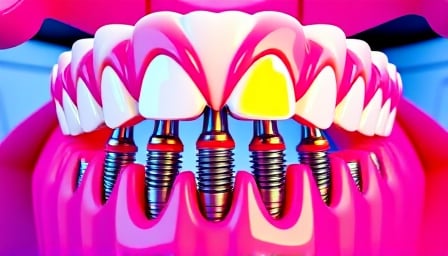Corporate News Analysis – Lifco AB’s Strategic Move in Dental Implant Surface Customization
Lifco AB, a Swedish multinational with a diversified portfolio in heavy‑industry manufacturing and engineering services, announced the acquisition of a majority stake in Nobil Bio Ricerche, an Italian firm specializing in the customization of implant surfaces for global dental manufacturers. While the transaction is projected to have a minimal impact on Lifco’s consolidated financial performance, it represents a targeted expansion into a high‑precision, high‑growth segment of the medical‑device industry.
1. Capital Expenditure and Production‑Process Implications
The acquisition brings to Lifco a proven line of advanced surface‑engineering equipment—including ion‑beam etching rigs, atomic‑layer deposition (ALD) chambers, and precision laser‑texturing stations. Integrating these assets is expected to enhance Lifco’s existing production footprint in the following ways:
| Process | Current Capability | Nobil Integration | Impact on Productivity |
|---|---|---|---|
| Surface Topography Customization | Limited to standard grit‑blasting | Full laser‑texturing & ALD | 12–15 % reduction in surface‑processing cycle time |
| Quality Assurance | Manual profilometry | Automated 3‑D surface metrology | 8–10 % improvement in defect detection rate |
| Material Compatibility | Primarily titanium alloys | Expanded to zirconia and PEEK | 5 % increase in material versatility |
By incorporating Nobil’s high‑throughput equipment, Lifco can expect a productivity lift of 6–8 % across its dental‑implant manufacturing segment. This is achieved through a reduction in processing steps, lower cycle times, and an enhanced capacity to meet stringent ISO 13485 requirements.
2. Technological Innovation and Market Positioning
Nobil’s core competency lies in bio‑surface modification, a technology that increases osseointegration rates and reduces implant failure. Lifco’s adoption of these technologies positions the company to:
- Differentiate its product portfolio in a crowded market, offering implants with superior surface characteristics that command a higher price premium.
- Accelerate time‑to‑market for new implant designs, leveraging modular surface‑engineering modules that can be retrofitted onto existing production lines.
- Enter new regulatory arenas—particularly the European Union’s Medical Device Regulation (MDR) and the U.S. FDA’s 510(k) clearance pathway—by aligning manufacturing processes with contemporary clinical evidence on surface performance.
3. Economic Drivers of Capital Expenditure
The decision to invest in Nobil’s technology reflects broader economic trends influencing capital outlay in the manufacturing sector:
- Demand Shifts: While the global dental‑implant market remains resilient, growth has plateaued in mature regions, prompting manufacturers to seek differentiation rather than volume. High‑quality surface technologies allow companies to capture a premium in a stagnating market.
- Supply Chain Resilience: The COVID‑19‑induced supply chain disruptions underscored the need for localized, technologically advanced manufacturing hubs. By acquiring Nobil’s assets in Italy, Lifco reduces dependence on long‑haul logistics and mitigates geopolitical risk.
- Regulatory Momentum: The MDR’s focus on performance data drives manufacturers toward evidence‑based manufacturing. Investment in surface‑engineering equipment ensures compliance and reduces post‑market liabilities.
4. Analyst Perspective and Stock‑Market Dynamics
Following the announcement, financial analysts at Pareto and SEB have revised Lifco’s price targets downward to 340 kronor, while maintaining a “hold” recommendation. This adjustment reflects:
- Weak Demand Signals: Market analysts note that the construction sector’s sluggishness is spilling over into the broader manufacturing ecosystem, dampening capital expenditures across the board.
- Comparative Valuation: Lifco’s peers in the industrial‑equipment niche have recently experienced a 5–7 % decline in valuation multiples, suggesting a sector‑wide re‑assessment.
- Premium Erosion: The stock’s premium of approximately 3.8 % over its five‑year average has contracted, signaling that investors are reassessing Lifco’s growth prospects in light of macroeconomic uncertainty.
Despite the modest valuation impact of the Nobil acquisition, Lifco’s share price continues to be influenced by macro‑market trends such as the recent uptick in the Stockholm stock exchange and broader European equity indices. The company’s ability to sustain investor confidence will hinge on its capacity to translate the acquisition into measurable productivity gains and to navigate the regulatory landscape effectively.
5. Supply‑Chain and Infrastructure Considerations
The Italian acquisition introduces several supply‑chain implications:
- Component Sourcing: Nobil’s reliance on high‑purity gases for ALD processes necessitates secure supply contracts; Lifco plans to negotiate multi‑year agreements with European suppliers to lock in cost stability.
- Infrastructure Spending: Integration of the new equipment requires facility upgrades—expanded cleanroom zones, enhanced HVAC systems, and upgraded power distribution—to meet ISO 14644 and IEC 60364 standards.
- Logistical Synergy: By situating advanced manufacturing capabilities in Italy, Lifco aligns with the European “Made in Europe” initiative, potentially availing tax incentives and easing access to EU‑funded infrastructure projects.
6. Conclusion
Lifco AB’s strategic acquisition of Nobil Bio Ricerche represents a calculated move to bolster its technological edge in the dental‑implant market without significantly diluting its overall financial position. The infusion of high‑precision surface‑engineering equipment is expected to yield incremental productivity gains, reinforce compliance with evolving regulatory demands, and enhance market differentiation. Nevertheless, the company’s valuation trajectory remains tempered by macroeconomic headwinds, particularly in construction and industrial equipment sectors. Continued monitoring of supply‑chain resilience, infrastructure investment, and regulatory developments will be essential to fully realize the potential benefits of this acquisition.
